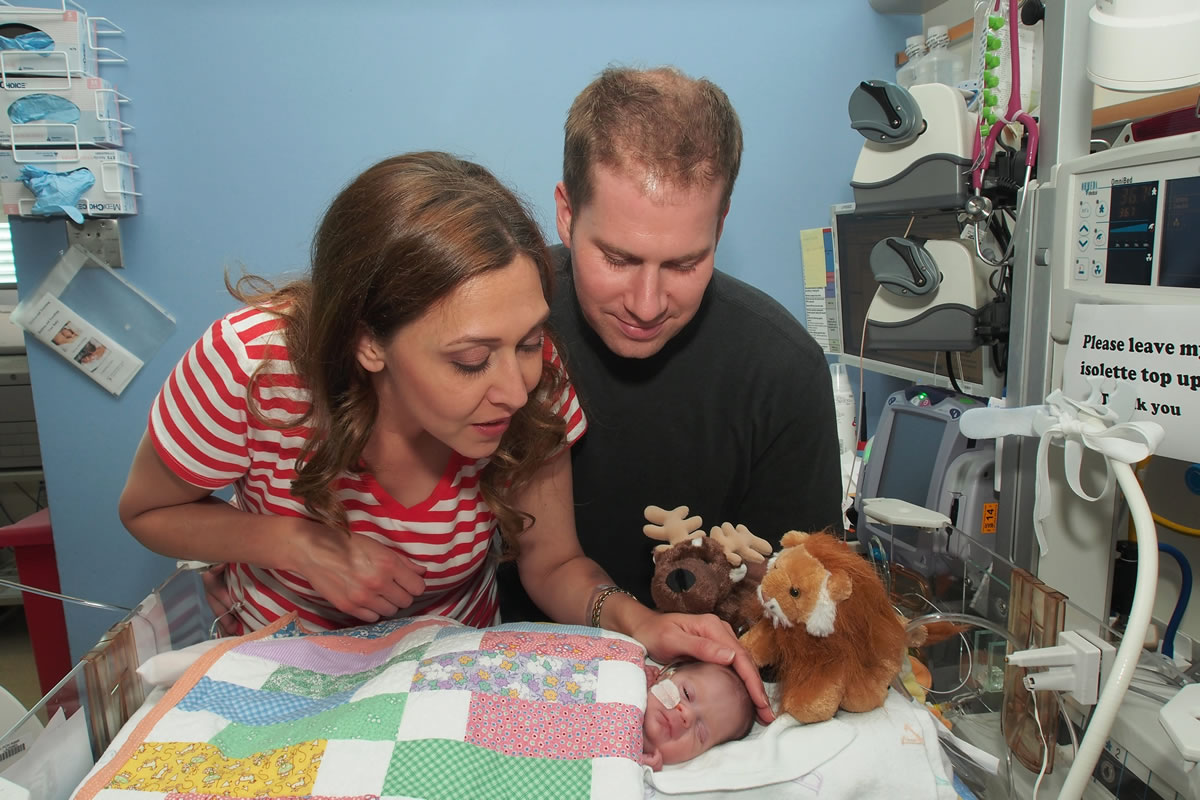When Congresswoman Jaime Herrera Beutler gave birth to her first child earlier this month, doctors believe the little girl was likely the first baby to survive a diagnosis previously considered fatal.
Camas residents Herrera Beutler and her husband, Daniel Beutler, on Monday announced that their daughter, Abigail Rose Beutler, was born July 15 at 3:13 a.m., at Legacy Emanuel Hospital in Portland, Ore.
While in utero, Abigail was diagnosed with Potter’s syndrome, caused by bilateral renal agenesis. Potter’s syndrome is a condition associated with a deficiency in amniotic fluid often caused by a baby’s prenatal kidney failure.
According to a press release, Abigail’s case absence of the kidneys resulted in anhydramnios, or a complete absence of amniotic fluid in the womb, which is critical to lung development.
The condition often results in terminated pregnancy. Babies born with the condition suffer from pulmonary hypoplasia, or severely undeveloped lungs, and are unable to breathe once outside of the womb.
After receiving Abigail’s diagnosis during the second trimester, the couple found a team of specialized physicians at The Johns Hopkins Hospital in Baltimore, Md. Herrera Beutler then underwent serial amnioinfusion, a relatively uncommon treatment, in which a saline solution is injected into the womb in the place of amniotic fluid to facilitate development.
When delivered pre-term at 28-weeks’ gestation in Portland, it is believed Abigail became the first baby on record with bilateral renal agenesis to breathe sustainably on her own.
“Through the outreach of a parent who had faced a similar situation, we found a group of courageous and hopeful doctors at Johns Hopkins who were willing to try a simple, but unproven treatment by amnioinfusion,” the couple said in a statement.
Every week for five weeks, doctors injected saline into the womb to give Abigail’s lungs a chance to develop.
“With each infusion we watched via ultrasound as Abigail responded to the fluid by moving, swallowing and ‘practice breathing,’” they said. “The initial lack of fluid in the womb caused pressure on her head and chest, but over the course of the treatment we were able to watch them reform to their proper size and shape. Her feet, which were clubbed in early ultrasounds, straightened.
“There was no way to know if this treatment would be effective or to track lung development, but with hearts full of hope, we put our trust in the Lord and continued to pray for a miracle.”
After the fifth infusion, Herrera Beutler went in to pre-term labor while at home in Camas and Abigail was delivered four days later with fully developed lungs, indicating the serial amnioinfusion treatment had successfully mitigated the risk posed by anhydramnios in the womb. Without functioning kidneys, she was still critically at risk, however, and required immediate peritoneal dialysis under intensive care.
At 16 hours old, she made her first trip from Portland to Palo Alto, Calif., and with the recommendation of pediatric nephrologists at Johns Hopkins was placed under the care of a team of specialized physicians at Lucile Packard Children’s Hospital at Stanford University. She had surgery the next day and began dialysis immediately after.
“The first doctors we encountered told us that dialysis or transplant were not possible,” the couple said. “No local hospital was prepared to perform the procedure necessary — peritoneal dialysis on a baby so small. Johns Hopkins was willing, but too far to transport. After a day of searching, we found a team at Lucile Packard Children’s Hospital who were ‘happy to have her.’”
Abigail is currently active, stable and breathing on her own at Packard Children’s. Though her doctors are uncertain what her future holds, she will require ongoing dialysis and eventual transplant.
“Despite Abigail’s prematurity, small size and life-threatening disease, she is doing well,” said Dr. Louis Halamek neonatologist at Packard Children’s and professor of neonatal and developmental medicine at the Stanford School of Medicine. “Together with our colleagues in pediatric nephrology, we are cautiously optimistic about her future.”
The couple said they are thankful on many levels.
“We are grateful to the doctors and nurses in Baltimore, Vancouver, Portland and California who, like us, were not willing to accept the fatal diagnosis, but were willing to fight for the impossible,” said Jaime and Daniel. “We owe a special thanks to Dr. Jessica Bienstock at Johns Hopkins, at Legacy Salmon Creek Hospital, Dr. Anya Bailis at Legacy Clinic Maternal Fetal Medicine, and the entire team at Lucile Packard Children’s Hospital. We are grateful to the thousands who joined us in praying for a miracle. But most of all, we are grateful to God for hearing those prayers.”




